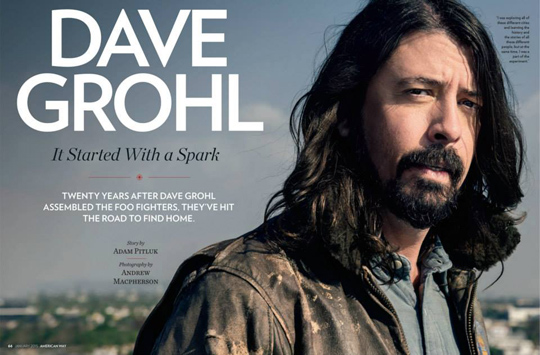 Listen up children, because this here is a history lesson about themusic your parents grew up on.
Listen up children, because this here is a history lesson about themusic your parents grew up on.Long, long ago, right about the time Daddy had to start shaving regularly and Mommy started noticing Daddy noticing her, a musical revolution was underway. Your parents, who were still in the getting-to-know-you stage, were grooving to hair-metal bands like Poison and Ratt and Cinderella on the mainstream FM radio stations. They were watching mini-movies of their favorite songs on MTV long before the network became the 24/7
reality show you know and love.
Then, one day in September 1991, your parents were tuned to MTV when a video from a Seattle group caught their attention. It depicted a pep
rally in a school gymnasium, featuring a three-person band that played a decidedly unpep-rally-y song. The students were subdued; a few tapped their feet, but most slumped forward. The cheerleaders went through a robotic routine. The janitor slow-danced with his mop. Then the drummer, this fresh-faced skinny kid with a shock of unkempt brown hair, banged on the skins like Animal from The Muppets. The gym turned into a madhouse, and the students rioted. A few weeks after seeing this Nirvana video, hair-metal bands limped off to their dying places, and the genre of grunge was born.
A swarm of similarly grungy, ire-infused bands emerged from Seattle, and Nirvana’s national anthem, “Smells Like Teen Spirit,” became the battle cry of a generation. Lead singer Kurt Cobain became a Jedi master over the next two years, and that skinny Skywalker of a drummer, Dave Grohl, became as known for his harmonious voice as for his percussion chops. Nirvana went on to sell more than 100 million albums worldwide, including the seminal recording from MTV Unplugged, which stripped down the reverb and distortion and showed that this Seattle band had some serious talent. It also provided one of the most haunting refrains in rock ’n’ roll history. When the guitars, bass and drums cut out and Cobain and Grohl harmonized to the repetitive lyrics, “All in all is all we are,” a look of total serenity — of absolute calm — settled over both of their faces.
Children: Go YouTube “Nirvana — All Apologies (MTV Unplugged).”
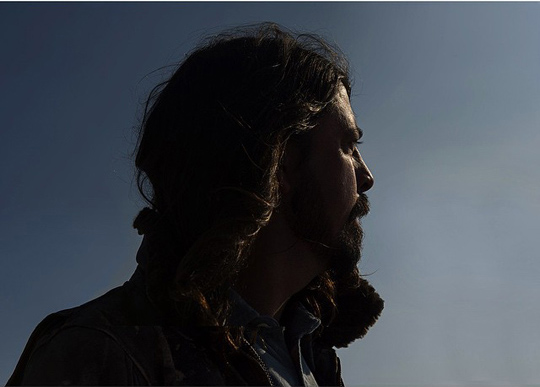
That’s why more than 20 years after the recording of Nirvana’s MTV Unplugged in New York, taped only a few blocks away from where we’re sitting, I ask Dave Grohl about that show and about that song.
“Oh, yeah,” he starts, looking toward the ceiling, searching his head for details of a long-ago faded memory. Then he straightens up and nods. A smile purses his lips. “That show was supposed to be a disaster. We hadn’t rehearsed. We weren’t used to playing acoustic. We did a few rehearsals and they were terrible. Everyone thought it was horrible. Even the people from MTV thought it was horrible. Then we sat down and the cameras started rolling and something clicked. It became one of the band’s most memorable performances.”
It did something else. While that album went on to win Nirvana’s only Grammy Award, it prepared Grohl for a decades-long career as the frontman of his own band. The Foo Fighters have been together for 20 years now. They’ve won 11 Grammys. And what’s more, Dave Grohl can officially claim that he’s responsible for shaping two generations of music listeners. That’s right, children: The music your parents grooved to back in the day is being made in contemporary times by the same dude. He’s showing no signs of slowing. Quite the contrary, actually. Young Skywalker has become a Jedi, like Cobain before him.
He sits there like Yoda, legs crisscrossed, arms resting on his knees. It’s mid-morning in Midtown Manhattan, and from the cozy confines of his hotel room near 57th and 7th, Dave Grohl looks relaxed in his well-worn blue jeans, long-sleeve black shirt and bare feet.
In about an hour, he’ll walk two blocks with the rest of the Foo Fighters to the Ed Sullivan Theater for a rehearsal with Ann and Nancy Wilson from the band Heart. They’ll jam to Heart’s “Kick It Out” on Late Show with David Letterman after they nail it down during sound check. It’ll reign as thunderous and as soul stirring as last night’s rendition of the Black Sabbath classic “War Pigs,” performed with Zac Brown. The audience tomorrow and the following evening will be similarly mesmerized when the Foo Fighters play with Tony Joe White and Rick Nielsen.
But not just yet.
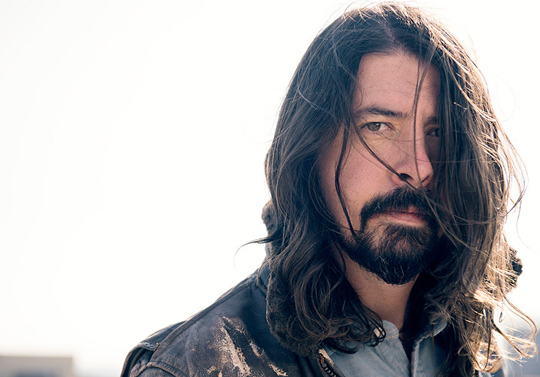
Grohl drinks his coffee while indulging me with a rock ’n’ roll trip down memory lane. It’s a completely apropos scenic pull-off of a conversation that dovetails well with the subject matter of his current project. Sonic Highways is the eighth studio album from the band that’s been a family for 20 years. For this project, Grohl, guitarist Chris Shiflett, bassist Nate Mendel, drummer Taylor Hawkins and former Nirvana fourth man and longtime Foo Fighters guitarist Pat Smear brought along an HBO camera crew to document making the album in eight iconic music cities. It’s a project Foo Fighters faithful have been anxiously awaiting. Especially me, since I had a heads-up about the project during a chance encounter with Grohl in Hawaii three months earlier.
“This all started with one idea,” Grohl says in the first episode of Foo Fighters Sonic Highways, “[that] the environment in which you make a record ultimately influences the end result.” His assertion is that local history and local people work their way into the music. Quite literally, the Ohio-born, Virginia-raised, Seattle-associated L.A. resident is the living embodiment of a career spent traversing the globe, let alone the country. And his music is a real-time reflection.
“I was exploring all of these different cities and learning the history and the stories of all these different people, but at the same time, I was going through that same thing,” he says.
“I was a part of the experiment.”
He was part of something else. Grohl, who has been in the spotlight for almost 25 years and who has been interviewed a gazillion times,
became the journalist, interviewing his heroes like Buddy Guy and the iconic Ben Jaffe from the Preservation Hall Jazz Band in New Orleans. Perhaps it’s because Grohl has been interviewed by the best rock writers in the world – guys like David Fricke and Paul Brannigan — that he has osmotically received a master’s degree in journalism. And perhaps that is why the interviews he conducts on Sonic Highways are so compelling.
“As I’m asking these questions, part of me is trying to get me to tell these beautiful stories that I’m vaguely familiar with, and part of me is just asking questions because I’m inspired. Just as these people are inspired to do their thing, I was inspired to do mine by them.”
That’s been the bandleader’s lot as much as his role over the years. Sonic Highways is indeed a weighty undertaking, but the other boys in the band come to expect original ideas from Grohl. The previous album, 2011’s Wasting Light, was recorded in his L.A. garage using only analog equipment. “I wanted to take the band out of our comfort zone, put the instruments in an unfamiliar environment – for them maybe, because I love garages and I’ve been playing in them my whole life. When you get more into the story of the music, that’s when it really gets its hooks in you.”
But there has to be a monumental amount of trust in the frontman for the rest of the band to go along with risky musical moves. It’s easy for fans and critics to analyze the end product and take to the blogs and the message boards about whether it worked or not. Internally, however, a fine line has to be not only recognized, but appreciated among the musicians, lest their internal arguments trump the music conversation on those same blogs and boards.
Twenty years ago, when they first formed, they were just trying to get on and off the stage without the show being a complete catastrophe. Then they started to get comfortable. “We have a saying in this band,” he says. “ ‘If it gets any better, it’s going to get worse.’ So we try not to think about stuff too much.”
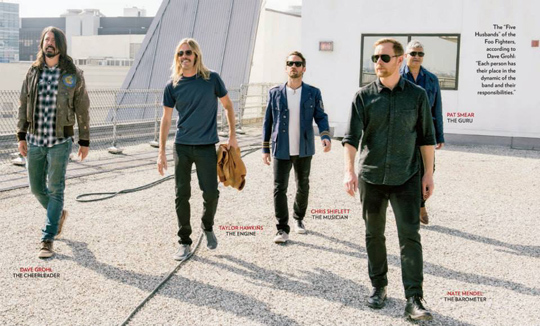
“We cling to each other,” he says. “We always have. It’s like I have four husbands.”
On a lazy summer day at a hopping resort on Hawaii’s Big Island, the pool scene looks as though a piñata full of children had broken open. My two daughters, ages 5 and 8, splashed and laughed and played. They buddied up with two other girls of the same ages. The sisters, Violet and Harper, became immediate summer-vacation besties with my girls, Maddy and Lilly. I was in the pool playing with them all, and after awhile, Violet and Harper’s daddy joined in.
We dads have an immediate bond when our kids are entertaining themselves. This dad, however, was different. He looked familiar, especially that shoulder-length brown hair and the beard. I also recognized his tattoos from so many shows over so many years. We talked about kids and where we lived and where we were from – typical dad talk. Then I introduced myself.
“I’m Adam, by the way,” I said while extending my hand.
“Hey, man. I’m Dave.”
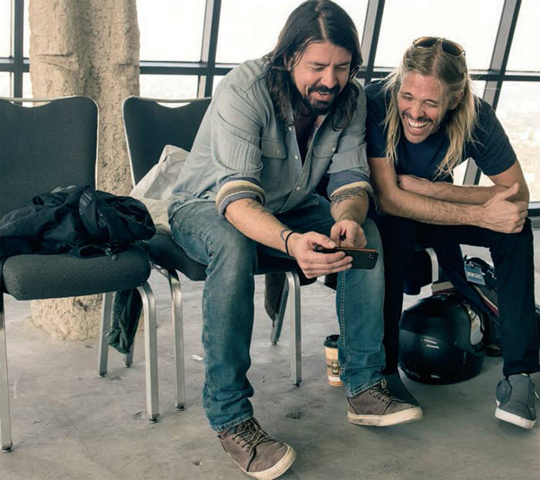
I started giggling at that. “Brother, the best concert I’ve ever seen in my life was Nirvana in Akron, Ohio, on Halloween night in 1993.”
“No way!” he replied, now animated.
“You were at that show? When Kurt was dressed as Barney the dinosaur and I was wrapped in gauze like a mummy? That gauze was so tight that the roadies had to try to cut it off me while I was still playing!”
That show was more than 21 years ago.
“How do you remember a concert at the University of Akron from that long ago?” I asked.
“I remember all my shows.”
Back in New York, we’re wrapping up our interview. Dave Grohl has Letterman to do, and he needs to jump in the shower. Before we part company, I want to know – on a human level – what the trick is to not only staying relevant after all these years, but how it is that the seasoned, rounded-out band has been able to play nice this long.
“We don’t ever take it for granted,” he says, pausing for a moment to reflect on the words. “I honestly don’t know what life is like without the Foo Fighters. I can’t imagine. So when we get onstage, it’s a good thing. And while we’re onstage, we’re enjoying it. Always.”
We’re enjoying it. Always.
This concludes the day’s lesson, taught to you by a Jedi. The takeaway isn’t just how to make a band work, but how to make your relationships work with your parents, your spouse, your partner. The trick is to not just get onstage night after night, year after year. The trick is to enjoy what you’re doing and appreciate who you’re doing it with. Pile into the same van. Squeeze into the same room. Don’t ever take for granted what you’ve got.
That’s how you do it, children. Words: Adam Pitluk Pics: Andrew Macpherson
